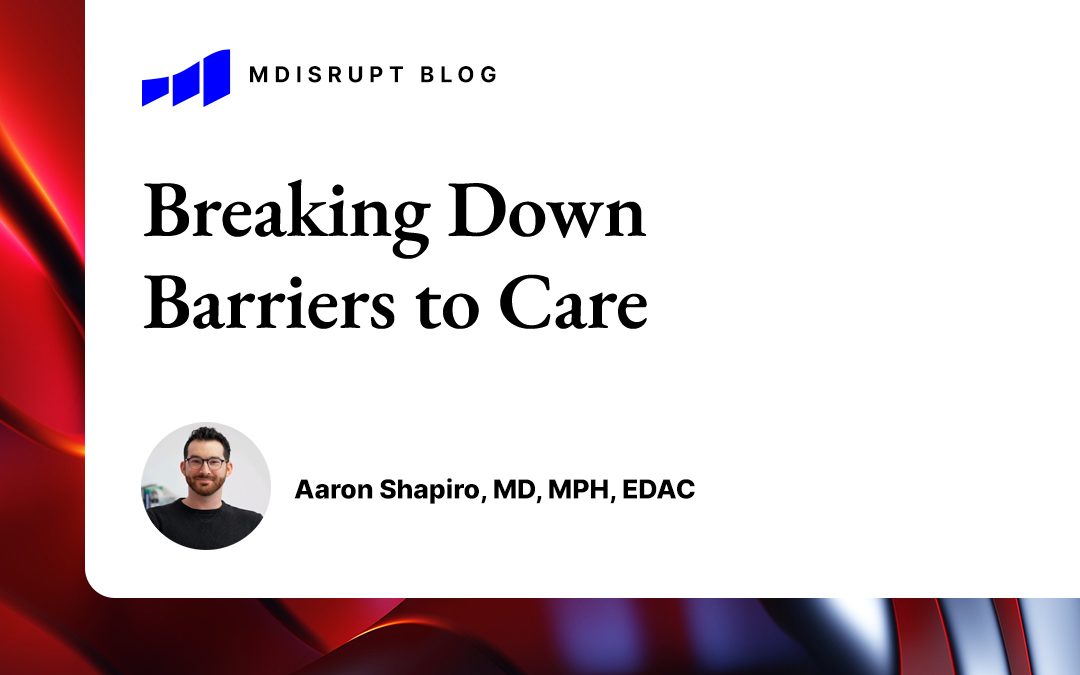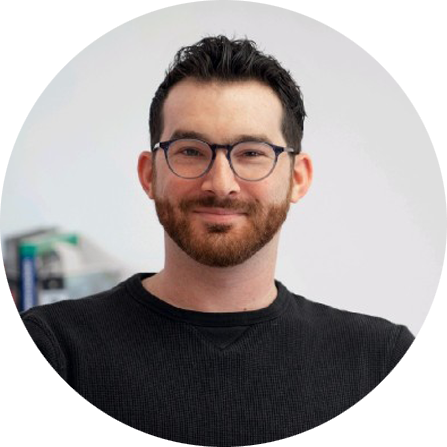
Breaking Down Barriers to Care

MDisrupt Expert Aaron Shapiro, MD, MPH, EDAC, is a primary care physician focused on improving health equity. In a world where many people lack access to appropriate care—whether because they live in underserved areas, face discrimination in accessing care, don’t have the right technological resources, or have been systematically excluded from clinical trials and genetic databases—he is working to bring down the barriers experienced by marginalized populations.
Building multifaceted expertise
MDisrupt: Tell us about yourself.
Aaron Shapiro: I’m a primary care doc finishing up my residency in Primary Care Social Internal Medicine at Montefiore Medical Center in the Bronx, NY. I grew up in Maryland, went to medical school at Brown University, got my Master of Public Health focused in Healthcare Leadership and Management at Johns Hopkins, and got my Evidence Based Design Accreditation and Certification (EDAC) from the Center for Health Design. EDAC is a professional certification awarded to practitioners who have demonstrated competency in applying evidence-based design principles to healthcare contexts.
I’m moving home to the DC area to settle in as a primary care doctor at an inspiring Federally Qualified Health Center in a high Health Professional Shortage Area, about half of which will be through their Health Care for the Homeless branch.
Connecting clinicians with industry-changing innovators
MDisrupt: What’s your perspective on the state of digital health today?
Aaron Shapiro: I am constantly inspired by the advancements of health technology. But as a primary care doctor working in underserved areas, serving people historically marginalized by our government and capitalist-driven healthcare systems, I am regularly disenchanted that these innovations often don’t make it to the clinics I work in. There are many reasons for this, stemming from the disenfranchisement of communities of color through years of racist redlining policies and exclusively revenue-focused business models that do not identify low-income communities as sufficiently profit-generating.
MDisrupt: How do you see health technology impact your everyday work?
Aaron Shapiro: Health technology has become ubiquitous in healthcare. But my profession is slow to change. We still have vestiges of very old technology slowing us down. Our professional culture is far from one that embraces rapid adoption of new workflows. So even when a new technology is introduced, it’s often done in a very targeted, siloed way that mutes its potential for large-scale system wide progress.
As someone fascinated by healthtech and healthcare innovation, I get very excited learning about the inspiring, innovative work so many are doing to improve healthcare delivery. But so much of this work is done in a traditionally proprietary fashion. So very little makes its way to my patients in under-resourced health systems.
Bringing innovation where need is greatest
MDisrupt: Tell us about some solutions you’re working on to make a difference.
Aaron Shapiro: Nowadays I spend most of my time thinking about how we can adapt and implement high quality health service innovations for those who need them most.
So I founded an initiative called Differential Design, which seeks to harness the power of healthcare technology, management, and design as tools to advance health equity and justice. There’s this enormous potential to help existing healthcare providers provide better care. But there are so many barriers to them having the resources, time, and experience to be able to identify the appropriate tools to improve the efficiency and quality of their service delivery—let alone implement them, let alone imagine doing that on a shoestring budget. But I think there’s so much potential in this space!
For example, we recently launched clinici.wiki, a free crowdsourcing initiative to help primary care providers more efficiently practice patient-centered, evidence-based medicine, even in high-volume clinics with limited resources. And after implementing a huge Knowledge Management System project at the clinic I currently work in, we are now in the process of making that work accessible to everyone at no cost through The [Your Clinic] Wiki project, so that any and every clinic can adopt efficient health technology work-flow support regardless of budget, management capacity, or healthtech experience.
MDisrupt: What got you interested in MDisrupt?
Aaron Shapiro: I really appreciate MDisrupt’s focus on pragmatically getting tech and innovation-minded practitioners to join these potentially industry-changing teams with the hope to decrease harm and maximize impact.
And I do see the ecosystem starting to change. I see more and more companies adopting the triple aim—defined as improving the experience of care, improving the health of populations, and reducing per capita healthcare costs—as central to their innovation work. And I think large healthcare systems, including government payers, are starting to listen.
Toward a more inclusive future
MDisrupt: What do you see as the future of the healthcare system?
Aaron Shapiro: I see a future where health technology is used to ensure quality healthcare services for everyone, regardless of income, education level, or historical disenfranchisement by our government and capitalist healthcare-industrial complex. I see a future where health technology allows us to return healthcare to experiences of healing, safety, and comfort.
Find Aaron on twitter: https://twitter.com/aaronmshapiro
At MDisrupt, we believe that the most impactful health products should make it to market quickly. We connect digital health innovators to the healthcare industry experts and scientists they need to responsibly accelerate product development, commercialization, adoption, and scale.
Our experts span the healthcare continuum and can assist with all stages of health product development: This includes regulatory, clinical studies and evidence generation, payor strategies, commercialization, and channel strategies. If you are building a health product, talk to us.
